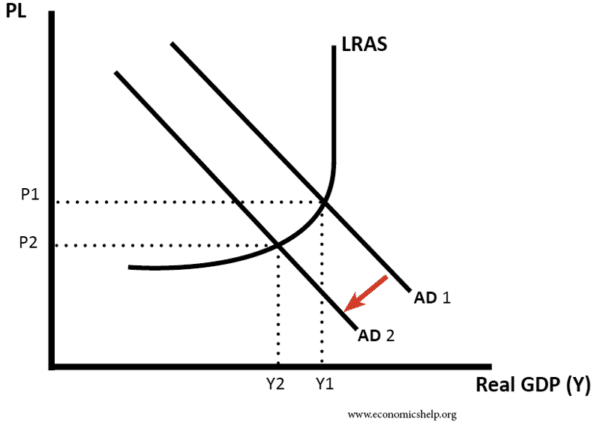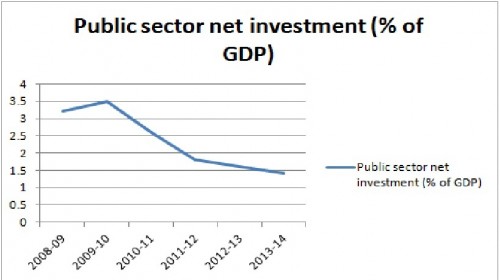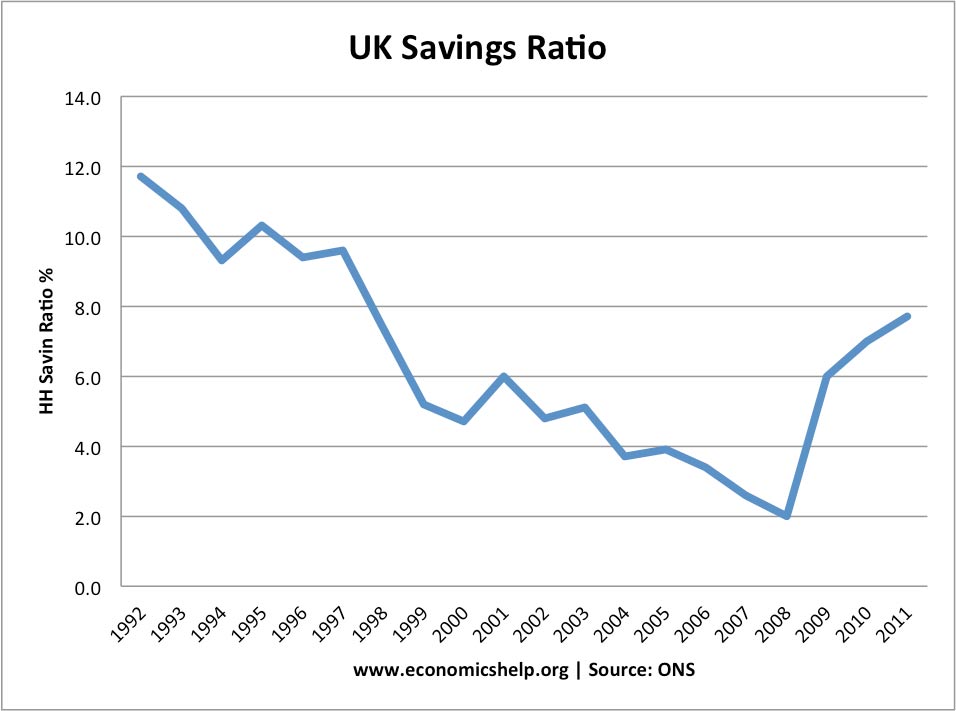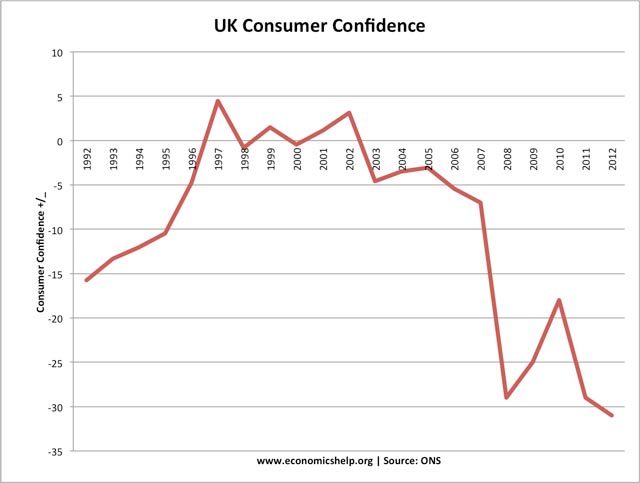Source ONS | NTV
A possible unit 4 A Level question this summer could be:
Discuss the impact of a fall in public sector investment on the UK economy?
The graph shows a fall in public sector investment from 3.5% of GDP in 2008 to 1.5% in 2011. This means cuts of approximately £30bn a year.
It means the government is spending less on capital investment projects such as new schools, new roads and other infrastructure investment.
That is quite a significant fall. With a fall in government investment, the first impact will be to reduce aggregate demand, lower economic growth and lead to higher unemployment.

Investment spending in the construction sector also tends to have a high multiplier effect (1.7 – 2.0). This study by RICS claims a multiplier of 2.84. If there are fewer investment projects, construction workers will be more likely to be unemployed, and therefore, they will spend less causing a further fall in demand in the economy. Therefore, a fall in investment spending could cause a bigger fall in AD, than the initial cut in government spending.
Furthermore, given the weakness of other areas of the economy, this fall in government spending will lead to a significant fall in AD. If the economy was in robust shape with growing private sector demand and a strong export sector, this fall in public sector spending would not be so serious. But, the UK economy remains in a double dip recession with the uncertainty of the Euro crisis discouraging private sector investment.
One benefit of cutting public sector investment is that it will help reduce government borrowing. In the UK borrowing is forecast to be £123bn in 2011-12. Therefore, without a plan to reduce government spending and deficit, we may see a rise in bond yields as markets are concerned about the rise in government debt. An increase in interest rates would be very damaging for the UK economy given the levels of household debt and fragile nature of spending.
Another argument is that cutting government spending should enable ‘more efficient’ private sector spending and investment. It is argued, government spending can ‘crowd out’ the private sector spending. Reducing government spending helps reduce government borrowing, keeps interest rates low and encourages the private sector to spend and invest.
However, it is debatable whether interest rates would actually rise if the government invested an extra £30bn. Interest rates have fallen since 2008 because there has been a rise in private sector saving and demand for buying secure bonds. The interest rate on long term index-linked yields is low at 0.5%. This suggests public sector investment could be financed for a very low annual interest payment.
Also, the continued rise in the savings ratio shows that we are in a liquidity trap. Despite ultra-low interest rates, consumers are wanting to save and repay debt. Cuts in government spending have not led to improvements in public sector investment. Therefore, this suggests that the fall in public sector investment has contributed to the recent double dip recession. This rise in private sector saving suggests, there should be strong demand for government bonds, illustrated by low interest rates. Therefore, the government can afford to be patient in reducing government debt in the short term.
Confidence Factor
It was hoped that spending cuts would improve ‘confidence’ But, actually, the opposite happened. 2010, saw a slide in consumer confidence to the lowest levels. Stats for 2012 (March 2012).
This suggests government spending cuts have contributed to a fall in consumer confidence.
Furthermore, as well as demand side factors, it is important to consider the impact on long term productive capacity. There are many infrastructure projects which are not profitable for the private sector, but necessary for the long-term future of the economy. For example, overcrowding at Heathrow and on British roads is hampering Britain’s economy and putting off inward-investment. Without forward thinking investment, the economy will lag behind in the long term.
In conclusion, the cut in public sector investment threatens both the demand side and supply side of the economy. Cuts in investment have been a significant factor in keeping the UK economy in recession. Markets are less concerned about short term deficit reduction. More important is the long-term prospects for economic growth and the long-term structural deficit.
Related




To cut public sector investment spending during a recession is raving bonkers. But it’s not only in the UK that this has happened: the US is no better. See:
http://ralphanomics.blogspot.co.uk/2012/05/obama-boasts-about-having-cut.html
http://ralphanomics.blogspot.co.uk/2012/05/us-public-sector-cut-employment-during.html
http://ralphanomics.blogspot.co.uk/2012/03/states-didnt-actually-spend-stimulus.html
Even more daft is to cut public sector investment, and then start wittering on about “shovel ready” projects. You really have to wonder why we bother studying economics and try regulating economies. The incompetence of the authorities is on such a gargantuan scale that we might as stop trying to regulate economies and just return to 19th century unfettered free markets and capitalism in the raw.
Absolutely right Ralph. The fact that the Coalitions “bonkers” economic strategy gets so much praise from the likes of Telegraph readers is remarkable. You’d have to be ignorant of both economic theory and global economic history to think taking exactly the opposite course to successful economic recoveries (Roosevelt’s new deal, the UK post-war consensus, European mixed economies, the Argentine recovery, even Hitler’s rearmament) and actively reducing aggregate demand, would end in anything but economic chaos.
George Osborne has no qualifications in economics (unless you count GCSE Maths!), but one would have thought that his 2:2 in History may have enlightened him on the subject of economic history.